Tom Slattery, the Long Distance Runner Chasing His Goals
After not finding fulfillment in his nine-to-five, Slattery pursues a dream with the Coast Guard
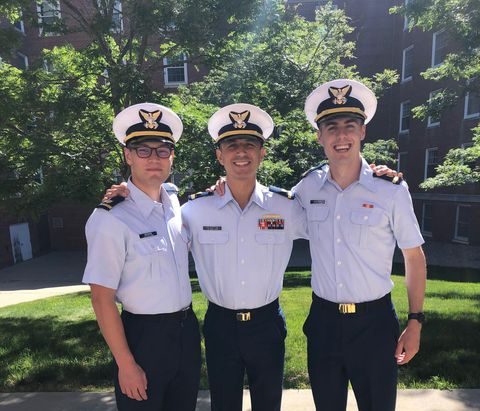
COURTESY OF TOM SLATTERY
Tom Slattery, GSBRH ’18, stands at right in his Coast Guard uniform with fellow Coast Guard recruits.
December 27, 2021
CORRECTION: A previous version of this story misstated that the Coast Guard reserve training was three weeks. As of Jan. 3, 2022, this article has been updated to reflect that the training was five weeks.
It was a long day after work for the Coast Guard in New Orleans, and Tom Slattery, Gabelli School of Business at Rose Hill ’18, called his high school coach with an important decision to make.
He was deciding whether or not to scratch from the NYC Marathon this year.
For two and a half months, Slattery had been juggling a full-time job and weekend trainings for the Coast Guard while still keeping up with his marathon training to be ready to race in the pro league come November.
“It was a battle,” Slattery said. “I just felt so unfulfilled with what I was doing in my professional career, and the training for the marathon was definitely my priority at that point.”
But in the back of his mind, he knew something would have to give.
The NYC Marathon was set for Nov. 7, 2021. Two months before the race, Slattery was deployed to help out with Hurricane Ida for the Coast Guard. He had 24 hours to fly to New Orleans where he would be stationed for the next month.
The 90 miles per week that he had been putting in on the pavement was cut down to 12 miles every other week, hurting his fitness. Racing a marathon in two months and finishing competitively started to seem like an impossible feat — yet, he wasn’t ready to give up.
“I knew that he was an excellent runner, and I knew that he was very good on the state level as an individual, but he wouldn’t have been a national talent in the way that our relay was.” Kevin Beirne, FCRH ’04
The First Mile
Slattery’s running career first prospered at Chaminade High School, a private Catholic school on Long Island. As the youngest of three, he naturally looked up to his two older siblings, who were also runners, to set the path for success.
Both of his older siblings were long-distance runners and Slattery followed their example. His main distance races were the two-mile and 800 meter, but sometimes he would drop down to middle distance races, showing his versatility in the relays.
In the individual races, he was a strong competitor, setting personal records of 15:55.80 in the 5,000 meters, 9:27.79 in the two-mile and 1:57.61 in the 800 meters. It wasn’t until his junior year that he became serious about earning a running scholarship for college.
His coach at the time, Kevin Beirne, Fordham College at Rose Hill ’04, who also ran for Fordham, encouraged Slattery to focus on the relay races. The relay team was a favorite to win at national championships, and Beirne saw this as an opportunity for Slattery to stand out at the national level.
“I knew that he was an excellent runner, and I knew that he was very good on the state level as an individual, but he wouldn’t have been a national talent in the way that our relay was,” Beirne said.
Slattery was quickly on board and focused his efforts on the relay races in the distance medley and 4×800. He was the team’s first runner and set the tone on the track for the rest of his teammates to carry through.
“He was absolutely the guy that all the coaches wanted at the leadoff spot,” Beirne said. “If he was getting tired in the race, I felt personally that there was a big push from him to give it more because he was on a team and because he was thinking of other people.”
At the 2014 Penn Relays, a national meet which invites only the top 12 relay teams nationwide to compete, Chaminade was seeded as the number two team with a good chance to win the 4×800 relay.
Slattery took his place as the leadoff guy next to the first-place runner from Jamaica. As he raced around the turn, he tripped on the rail, stumbling forward with his arms and flailing to catch himself.

“We thought he was going to fall — and I think that a lesser kid would have fallen on the floor and maybe looked for attention,” Beirne remembered. “I know that he felt that pressure of being on the team and was like, ‘I have to recover from this.’”
Instead of allowing his body to fall, Slattery managed to reorient himself and ended up running one of his fastest splits ever.
Slattery’s performances in the relays caught the attention of Tom Dewey, the former head coach for Fordham men’s track & field and cross country. Familiar with Slattery’s older brother, who was also recruited by Fordham, Dewey had watched Slattery for a year and a half while he ran at Chaminade.
He noticed that Slattery could be placed in any leg of the distance medley relay — either a 400, 800, 1,200 or 1,600 meters — and he could perform well in any of them. Dewey saw a natural talent and work ethic in Slattery that he wanted for Fordham’s team.
Slattery was offered athletic scholarships to both Michigan State University and Fordham. In the end, Fordham was his pick because of its Jesuit affiliation and financial aid support.
“He was probably one of the most dedicated people on the team.” Ryan Kutch, GSBRH ’20
“I really enjoyed it, I really, really did,” Slattery said about his time at Fordham. As an NCAA Division I athlete, he was committed to running three seasons — cross country, indoor track and outdoor track. The running joke on the team was that Fordham got the most “bang for the buck” with track athletes because it isn’t a single-season sport.
Practices started at 7:30 a.m. every day of the week, races were held on weekends, and runners were expected to fit in a long run at least once a week.
“It’s a seven day, 24/7 sport,” he said. This level of discipline was a welcomed challenge for him, and he took on the responsibility to set the tone for the other runners.
“He was probably one of the most dedicated people on the team,” Ryan Kutch, GSBRH ’20, who ran with Slattery at Fordham said. As Slattery’s younger teammate, Kutch wasn’t at the experience level that Slattery was, but practicing together pushed him to be a better runner. Sometimes he even tried to beat Slattery during workouts and races.
“I don’t know if he encouraged that,” Kutch laughed. “But just like me, I think he would want someone to challenge him if I could because he is a competitive runner.”

Slattery’s competitive drive may come as a surprise to those who meet him, given his quiet demeanor. But even though Slattery wasn’t the loudest, the work that he put into the team did not go unnoticed. Dewey saw him improve over his four years and had a hard time recalling a bad race of his.
“Even his bad race seemed to be maybe mediocre and probably would be good for other people,” Dewey said. He described Slattery’s progression as gradual and consistent. “It was done in such a quiet way that you had to look back at the end of the year and see what he did, and it was pretty nice,” he said.
While at Fordham, Slattery majored in business administration and management, and he had his eyes set on pursuing a career in finances, working in startups. Throughout his four years, he landed internships at Negotiatus and JetBlue, and was a member of the Student Athlete Advisory Committee.
In his senior year, Slattery was a two-time Metropolitan Champion and broke Fordham’s 33-year-old record by 15 seconds in the 5,000 meters. But the passion he felt on the track did not transition well to the corporate world.
“It didn’t really feel very fulfilling,” he explained.
Switching Teams
After he graduated, Slattery took a job with a law firm and focused on furthering his running goals. Within the first year of graduating, he joined the New York Athletic Club with his mind set on qualifying for the Olympic Trials in the marathon — a significant jump in distance from what he had been racing in college.
His weekly mileage at Fordham increased over the course of his four years, averaging around 60 to 70 miles his first year to over 100 by the time of his senior year. Because he was accustomed to the discipline needed to endure this level of training, the 90- to 110-mile plan he was on for the marathon didn’t seem too drastic of a switch.
After a strained calf pulled him from his first attempt at the marathon, and falling just nine seconds over the standard to qualify in the second attempt, Slattery finally was able to give the qualifier one last shot. At the Chevron Houston Marathon on Jan. 19, 2020, he ran a 2:18:32, finishing 28 seconds under the qualifying standard and securing his spot at the Olympic Trials.
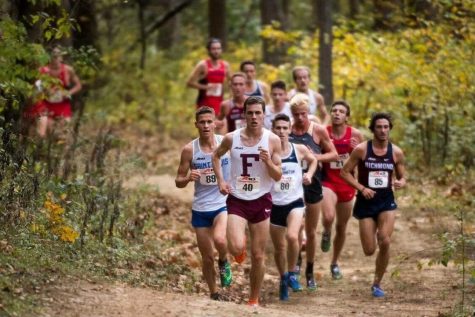
He raced his third-ever marathon at the Trials on Feb. 29, 2020, coming in 152nd place out of 175 men. Following this race, Slattery set goals to run in the NYC Marathon that November and potentially earn a place at the Summer Olympics in 2024.
Less than a month after his race at the Olympic Trials, the pandemic hit. Like many other runners experienced, many of his races were canceled.
“After that, it became ‘what am I going to do?’” he said. His first two years out of college had been focused on pushing his running goals and when those came to a halt, he started to question where he was headed professionally.
He jumped from job to job at various financial companies throughout his postgrad, but none of them were giving him the sense of fulfillment that he needed.
The camaraderie that he had throughout his running career in high school and college was suddenly back in his life — though it took on a new form.
“I really hated it. I was dreading going to work,” he said. So he took a leap of faith on the Coast Guard.
Dewey had encouraged Slattery with the Coast Guard during his senior year. He recognized the strong character and leadership skills he exhibited on the team and believed that the Coast Guard would be a good fit for him.
While at Fordham, Slattery didn’t immediately pursue this option, still hoping to do something within business. “But I think there’s a reason why it didn’t happen,” he said.
The winter of 2020 was a low point in Slattery’s life. “I had COVID so I couldn’t train … and I hated my job. I was in a really dark place mentally,” he said.
Even though he had considered the Coast Guard before, it wasn’t until Slattery took the five-week reserve officer candidate program with the U.S. Coast Guard to finally become commissioned as an officer in Coast Guard Reserves, when he realized that this was where he belonged.
Just like at the start of a race when runners gear up for the intensity of the task at hand, everyone at the Coast Guard brings that same attitude.
The camaraderie that he had throughout his running career in high school and college was suddenly back in his life — though it took on a new form.
The Coast Guard felt very familiar: Just like at the start of a race when runners gear up for the intensity of the task at hand, everyone at the Coast Guard brings that same attitude, knowing the challenge will be difficult, but ready to support one another to achieve the shared goal.
His Fordham coach knew that making the switch wasn’t easy for Slattery. For one, getting admitted to the Coast Guard Academy is no easy feat. Academies are highly selective, only admitting roughly 300 applicants from a pool of thousands.
“This is really where I feel like the work we’re doing is impactful.” Tom Slattery, GSBRH ’18
But it was also not easy to go down a path that might not pan out. Dewey said it was rare for Slattery to make a decision and think of just himself. At his JetBlue internship, Slattery used to receive free flights for working a number of hours, and he chose to give those flights to his Fordham team.
Taking a chance on the Coast Guard was something he needed to do for himself. “I don’t think he wanted to waste another year,” Dewey said.
The Coast Guard gave him the sense of purpose he was looking for in his other jobs. “This is really where I feel like the work we’re doing is impactful,” he said.
After becoming a Reserve Officer in the summer of 2021, he still had to maintain his full-time job at the law firm, but was making fast pace to ultimately reach full-time status with the Coast Guard.
Slattery was still training to race in the pro league for the NYC Marathon that November.
It is uncommon for a young officer to be deployed to help with hurricane response, but Slattery made his interest known and “knocked on every door” he could to have the opportunity to help out during hurricane season.
All the while, Slattery was still training to race in the pro league for the NYC Marathon that November. This year’s race was all the more special with the one prior having been canceled.
New Race, New Goals
When he got the solicitation to help out with Hurricane Ida in New Orleans, it was the opportunity he had been looking for.
But he was at a crossroads. That’s when he called Coach Beirne.
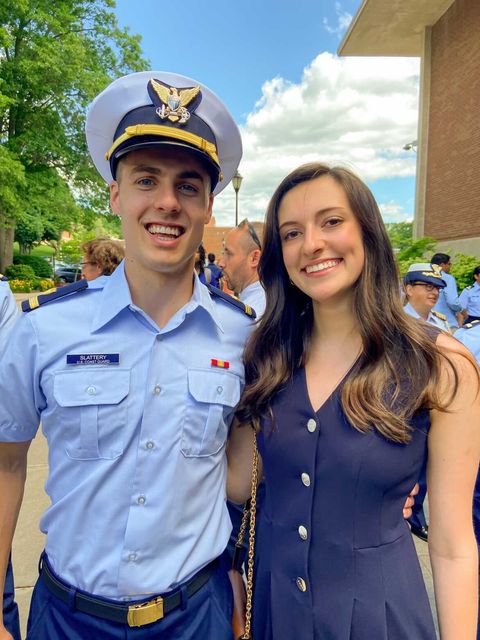
“I was honored that he called. I was really, really touched,” Beirne said. They don’t call each other often, and they only text once every two or three years. “So when he called and he said I’d really like to get your advice on this, I knew it was an important decision.”
Slattery wanted his old coach’s advice on whether he should pull from the marathon. His conditions going into the race in a month were not good, given the lack of training, but something inside him couldn’t make that decision on his own.
“I didn’t want to tell him, ‘oh, it’s going to be fine — you’ll be able to gut it out,’” Beirne reflected. He knew what Slattery was capable of racing competitively, and believed that he could run an even faster race than his 2:18:32 performance in 2020, but at that moment in time, his best performance wasn’t going to be at the NYC Marathon.
“I thought it would probably be better for him and for his psyche and for his running career to push back a little bit and get quality training under him so that he can run the race that he is worthy of running,” Beirne said.
The advice was tough to tell him, but Beirne felt that Slattery wanted his honest perspective.
On the call, Slattery decided to scratch from the race. Beirne told him he made the right choice.
Even though he didn’t get to run in the marathon, he was still at the race on the incident management team for the Coast Guard, and this team felt just as rewarding as running any individual race.
Slattery still has running goals on the horizon — right now he is registered for the Boston Marathon in the sub-elite field — but the Coast Guard is the team he wants to be on the most. He is currently trying to move to Washington D.C. to secure a position at the headquarters.
“It really does take a village with whatever goal you have.” Tom Slattery
The finish line may still be miles ahead, but Slattery keeps working toward his goals knowing that he has a team of people behind him.
“It really does take a village with whatever goal you have,” he said.
His past teammates and running coaches make up the village that he leans on to pull him through.
“Those ups and downs really hurt, and it is really discouraging, but having that village — having that team — that’s really big,” he said.


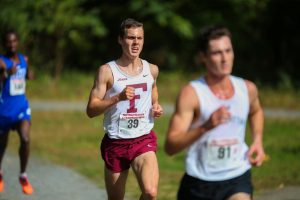
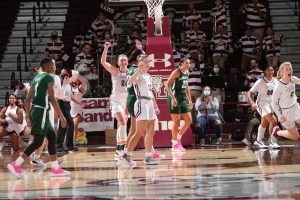










Charlie Kutch • Jan 3, 2022 at 7:02 pm
Great article! Met Tom while he was running at Chaminade against St. Anthony’s. A few years later when Ryan joined him at Fordham I got to see Tom more frequently and realized he was a very talented runner but more importantly a true leader. He was all about team as a Ram and I have no doubt he will be a valuable member of the Coast Guard. And hopefully one day we will see him breaking the tape at the NYC marathon! Good luck Tom.
K. Chapman • Jan 3, 2022 at 2:03 pm
So proud of my nephew.